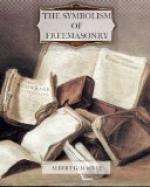[21] Spirit of Masonry, p. 100.
[22] Varro, according to St. Augustine (De Civ. Dei, vi. 5), says that among the ancients there were three kinds of theology—a mythical, which was used by the poets; a physical, by the philosophers, and a civil, by the people.
[23] “Tous les ans,” says Sainte Croix, “pendant les jours consacres au souvenir de sa mort, tout etoit plonge dans la tristesse: on ne cessoit de pousser des gemissemens; on alloit meme jusqu’a se flageller et se donner des coups. Le dernier jour de ce deuil, on faisoit des sacrifices funebres en l’honneur de ce dieu. Le jour suivant, on recevoit la nouvelle qu’Adonis venoit d’etre rappele a la vie, qui mettoit fin a leur deuil.”—Recherches sur les Myst. du Paganisme, tom. ii. p. 105.
[24] Clement of Alexandria calls them [Greek: myste/ria ta\ pro\ mysteri/on], “the mysteries before the mysteries.”
[25] Les petits mysteres ne consistoient qu’en ceremonies preparatoires.—Sainte Croix, i. 297.—As to the oath of secrecy, Bryant says, “The first thing at these awful meetings was to offer an oath of secrecy to all who were to be initiated, after which they proceeded to the ceremonies.”—Anal. of Anc. Myth., vol. iii. p. 174.—The Orphic Argonautics allude to the oath: [Greek: meta\ d’ o(rkia My/si~ais, k. t. l.], “after the oath was administered to the mystes,” &c.—Orph. Argon., v. 11.
[26] The satirical pen of Aristophanes has not spared the Dionysiac festivals. But the raillery and sarcasm of a comic writer must always be received with many grains of allowance. He has, at least, been candid enough to confess that no one could be initiated who had been guilty of any crime against his country or the public security.—Ranae, v. 360-365.—Euripides makes the chorus in his Bacchae proclaim that the Mysteries were practised only for virtuous purposes. In Rome, however, there can be little doubt that the initiations partook at length of a licentious character. “On ne peut douter,” says Ste. Croix, “que l’introduction des fetes de Bacchus en Italie n’ait accelere les progres du libertinage et de la debauche dans cette contree.”—Myst. du Pag., tom. ii. p. 91.—St. Augustine (De Civ. Dei, lib. vii. c. xxi.) inveighs against the impurity of the ceremonies in Italy of the sacred rites of Bacchus. But even he does not deny that the motive with which they were performed was of a religious, or at least superstitious nature—“Sic videlicet Liber deus placandus fuerat.” The propitiation of a deity was certainly a religious act.
[27] Hist. Greece, vol. ii. p. 140.
[28] This language is quoted from Robison (Proofs of a Conspiracy, p. 20, Lond. edit. 1797), whom none will suspect or accuse of an undue veneration for the antiquity or the morality of the masonic order.
[29] We must not confound these Asiatic builders with the play-actors, who were subsequently called by the Greeks, as we learn from Aulus Gellius (lib. xx. cap. 4), “artificers of Dionysus”—[Greek: Dionysiakoi technitai\].




